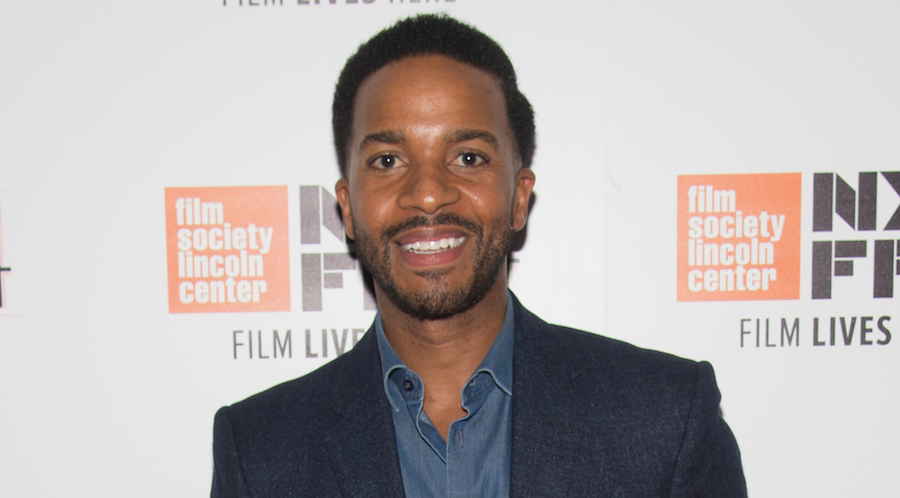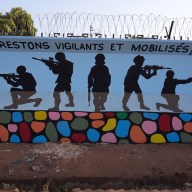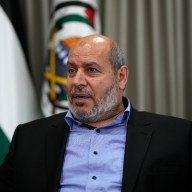On Steven Soderbergh’s show “The Knick,” André Holland gave a star-making performance: He played Dr. Algernon Edwards, a brilliant black surgeon who fought racism in 1900 New York. It’s the kind of turn that makes you want to see him in everything. Sure enough, he’s equally excellent in a smallish but crucial role in “Moonlight.” Unfolding over three time periods, Barry Jenkins’ acclaimed drama follows Chiron, a black boy from a low-income Miami neighborhood who grows into a bullied teen and then into hard, rough adult. We don’t see Holland till the last part: He plays Kevin, Chiron’s old friend, with whom he had an intimate experience as a teen. As an adult himself, Kevin has become wiser. When Kevin and Chiron (now played by Trevante Rhodes) reunite, their uneasy but hopeful conversation takes up most of the last half hour. Holland talks to us about how “Moonlight” is more than a message movie, how rare it is to see black people thinking onscreen and how “The Knick” didn’t, after all, open every door to him. I’m reluctant to say this is something every American can see, because I think it’s more complex than a mere issue movie. On the other hand, it would be great if every American saw this film and got to see people who are ignored and sometimes demonized by a lot of Americans. RELATED: Interview: Naomie Harris on “Moonlight” and how it’s (sometimes) funny I found that by the third story, it becomes more about this person than a statement. The restaurant scene is great because it’s so open and unpredictable. It’s not common enough to see these exact two people on movie screens, too. There’s a lot of complexity to Kevin, especially when you look at how much he’s changed over the three sections. That seems rare for anyone. I’m a massive fan of “The Knick,” and I was wondering if after it was over you were offered a ton of great projects?
Absolutely. It’s about marginalized people: black, poor, queer — people who’ve been pushed to the side. I love that this movie puts their story front and center. Barry does it in a way that doesn’t feel like it’s about that. It’s just about the human experience.
When I first read it, when I got to the third act, I was like, “Here it comes. Any minute [Chiron]’s going to become the thing we’ve all seen before.” But it doesn’t do that. Barry just sits with these people. That’s the sign of an incredibly confident filmmaker: He has the courage to say, “For the next half hour, we’re just going to watch these two black men figure it out. Slowly, methodically, painfully, they’re going to figure it out.” There’s no release valve; there’s no big fight where he says, “I really feel this!” or “The world should be like this!” There’s none of that. They’re just step by step, moment by moment trying to work through it.
Because the characters don’t know what they’re going to do. I don’t think Kevin comes into it with a big agenda. I don’t think he picks up the phone and thinks, “I’m going to rekindle my relationship,” or “I’m going to apologize.” He doesn’t know. He’s just making space for Chiron. As a result, Chiron is able to crawl out of himself a bit.
It’s rare that you get to see black people onscreen thinking. [Laughs] Just thinking, having a psychological experience. You don’t see that very often. Usually it’s the friend of the guy or he tells you where the star went. “Hey, guys, Tom Cruise went that way!” [Laughs] But in this movie, the camera just sits with these guys, thinking their way through a situation, feeling their way through it. That humanizes them.
He’s so complicated. I kept thinking, “What is he trying to do? What is that he wants?” For an actor, that’s the question you have to know. What I like about him is he understands so much; he’s come to understand a lot. Particularly this idea of masculinity. He’s performing what it is to be a man: sleeping with a lot of women, talking a lot of s—, being a tough guy. Somewhere between story two and story three, he’s changed entirely. He’s no longer doing that. He’s become a father. He at least acknowledges that there’s something unfinished between he and Chiron. And he has the courage to pick up the phone and make the call. Especially for a black man, where he grew up, to come to that understanding is pretty fascinating.
In my own life, I don’t have many examples of people who’ve been able to do that. You get an idea of who you are, especially if you don’t have a father to show you what it is to be a man. You get that idea and you stick with it. It becomes about survival. That’s what happened between these two kids. Chiron, in order for him to survive, he retreats inside himself. He wears his mask, he puts in his teeth, his bulked up his body — all these things to protect him. On the other side you have Kevin, who puts on this air of “I’m cool, everything is good, I don’t have any problems, I don’t have any feelings.” But they’re both doing the same thing: trying to avoid dealing with the thing itself. Both of them do a huge, courageous thing by saying, “We’re here.” As human beings we go to great lengths to avoid being hurt. If you get hurt early on as a kid, you put on the armor. And it’s hard to get it off.
To be honest with you, I thought after that show things would just be rolling in and I’d have my pick of what great projects I wanted to be a part of. That was a mistake, because that’s not quite what it’s been. The truth is it hasn’t really changed that much. There was a period of heartbreak, but what it has done is motivated me to create some opportunities for myself. I’m producing things as well, I’m optioning some material, working to get things together for myself. It’s been hard, but I’ve learned so much. And I’m not giving up. You’ve got to make it yourself.
André Holland says it’s rare to see black characters thinking onscreen

Getty Images
Follow Matt Prigge on Twitter @mattprigge


















